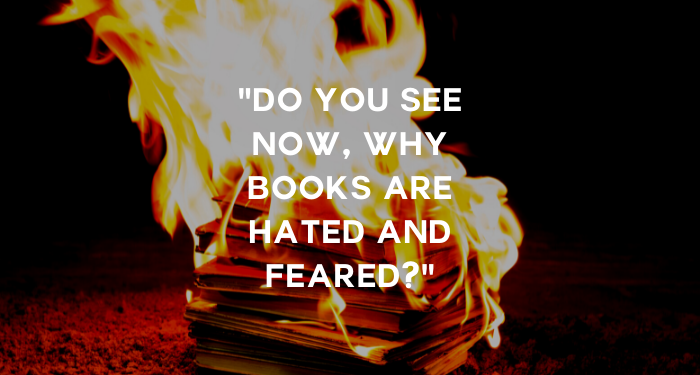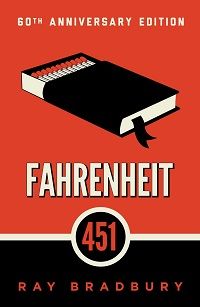
Rereading FAHRENHEIT 451 in an Age of Mass Censorship
I first read Ray Bradbury’s Fahrenheit 451 in the summer of 2013, when I worked in a bookstore. Although it was primarily a children’s bookstore, they also had a sizable YA and classics collection, and I saw the gorgeous cover of the 60th anniversary edition of this book and picked it up. I knew the premise, but nothing prepared me for the impact of this book. Earlier in the year, I had also finally read 1984, and was similarly stunned.
At the time, I kept thinking How did they know all of this, then? How is it possible that this is all still so eerily relevant? Well, as Neil Gaiman states in the introduction, speculative fiction is really good at “not the future but the present — taking an aspect of it that troubles or is dangerous, and extending and extrapolating that aspect into something that allows the people of that time to see what they are doing from a different angle and from a different place. It’s cautionary.”
Indeed.
Books and Real Life

The last few years have certainly felt like a review of some of the noted spec fiction: The Handmaid’s Tale, 1984, Brave New World, and Parable of the Sower, just to name a few. And, of course, Fahrenheit 451 — particularly recently. All over the country, books are being challenged and removed from shelves and classrooms, thanks to new laws that prevent or restrict teaching (or talking about) gender, race, American history, and sexuality. The American Library Association (ALA) released a statement in November 2021 condemning “acts of censorship and intimidation,” citing a significant increase in book challenges — 60% more in September 2021 than September 2020. Those are just the reported ones.
There are also the personal and professional choices that teachers make about what books to discuss, what books to put in their classrooms, reading corners, or libraries, and what authors to invite to speak to classrooms.
Many of these challenges are to books that are about LGBTQIA+ issues, those by BIPOC authors, or books that speak to the Black experience (particularly in America or American history). There are people campaigning for school board seats just so they can help strong-arm curriculum into something they deem “acceptable.” (Read: white, Christian, heterosexual).
Rereading Bradbury was uncomfortable. In this book, we see that thinking — especially critical thinking — is devalued. Human connection is devalued. Montag’s wife is obsessed with the people and stories in her wall-screens. People prize entertainment and surface thinking instead of talking, debating, and analyzing. They see the constant overstimulation of entertainment as the pathway to happiness. Clarisse, Montag’s teenage neighbor, says to him one day, “Do you notice how people hurt each other nowadays?” His conversations with her nudge something open in him. He starts to see the lack of connection and decency toward others, the lack of really seeing them as a person, as a fellow human.
It’s hard to read that and not think of how our social fabric has thinned and weakened since 2015; how the lack of caring for one another has come to the point that we aren’t even willing to do the smallest, most non-invasive thing like wearing a mask to help keep another person safer. How we can’t even have a civil discussion with nuance and intelligence, but resort to childish euphemisms (LGB) or outright slurs.
In the Classroom
But that’s just a small part of it. If you are keeping up with what’s going on in schools and libraries around the country, it’s infuriating.
In Texas, there have been efforts to require teaching “the other side” of the Holocaust…which would be, oh, the Nazi side. Our grandparents and great-grandparents who fought with the Allies risked their lives for this?
Recently in New Hampshire, there was a bill to “ensure teachers are educating students and not indoctrinating them.” What it would do, as written, would prohibit a teacher from teaching “any doctrine or theory promoting a negative account or representation of the founding and history of the United States of America in New Hampshire public schools which does not include the worldwide context of now outdated and discouraged practices. Such prohibition includes but is not limited to teaching that the United States was founded on racism.”
Mmm hmm.

“So now do you see why books are hated and feared? They show the pores in the face of life. The comfortable people want only wax moon faces, poreless, hairless, expressionless. We are living in a time when flowers are trying to live on flowers, instead of growing on good rain and black loam….” (Farenheit 451, p.79)
This truth right here — that books can reflect to us an ugly reality, a reality that is not always attractive, but is real — is one that too many don’t want to see or hear.
In this era of mass censorship or twisting of curricula, those who would seek to censor don’t want people thinking critically. They don’t want people learning new things or thinking about things too deeply. The narrower their worldview, the better. The less diversity, the less inclusion, the better. Don’t want to think about anything too “unpleasant” or think about how to connect with others and make the world a better place — as long as it’s good for you, that’s all that matters. Self-happiness.
For a while now, our connections to each other as people have frayed. We’ve lost basic decency. A sense of community and togetherness. Instead, we have seen a steady rise of fractures between people, even in our own families. All that matters is ourselves. Bradbury writes about the eventual effects of this kind of thinking in Fahrenheit 451. He writes about how the desire to suppress thinking and discomfort has eventually led to the annihilation of books, of ideas, with no new books to replace them — and the shell of society that is left.
Fahrenheit 451 is not just an inventive, classic book of speculative fiction. It’s a dire warning. One that gets more prescient every year. We’d be wise to take note while we still can.
For more about spec fiction and the parallels with our reality, check out this post about books that predicted Trump’s presidency, these accurate future predictions from sci-fi, and this post about dystopian reads where things could be worse.








